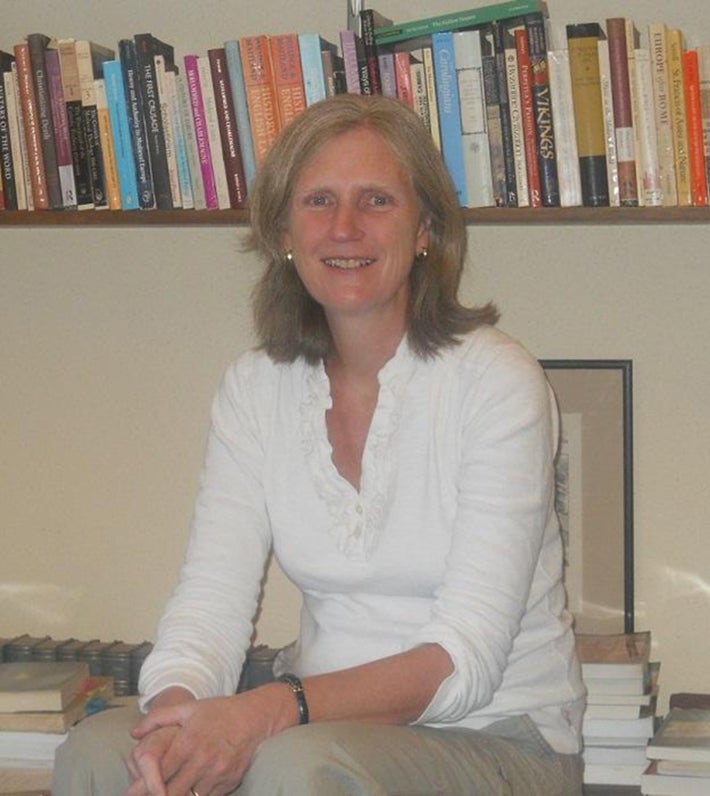An ancient history professor with an upcoming lecture at ASU says it’s important to remember the past as we deal with mental health care in the present.
Carol Neel, of Colorado College, said such awareness “expands our own imagination in responding to mentally ill people among us.”
Her talk, “Demons, Sorrow, Charity: Medieval Religious Communities, Lay Brothers and Sisters, and Mental Illness,” at 6 p.m. Thursday, Dec. 1, is well-timed. About 10 million Americans face symptoms of depression triggered by the winter blues, which psychologists say can be linked to the holidays.
Carol Neel, professor and chair of history at Colorado College, will speak at ASU about how mental illness was dealth with in the Middle Ages.
“A lot of people, during the holidays look at what is displayed in popular media, with happy families getting together and celebrating,” ASU psychology professor Suniya Luthar said. “And if you’re not with loved ones yourself during these times, it can engender enormous feelings of aloneness and grief.”
Luthar also said that even people with family around can feel stress from high expectations or peer pressure.
During the Middle Ages, Neel said, mental illnesses were treated more like a community issue rather than one specific to an individual. The way society has dealt with mental illness has changed drastically. It was only half a century ago that lobotomies — now universally condemned by mental health experts — were considered a legitimate treatment for a variety of psychiatric conditions, from depression to schizophrenia.
“One of the things they didn’t have in the Middle Ages, obviously, was Facebook and social media. People tend to post their happiest photos and moments on social media,” she said, adding that it can lead to constant comparisons and anxiety.
“Medieval monks surrounded sufferers with a circle of support from human hands and angelic voices,” she said. “This entire approach showed basic differences between moderns and medievals in their views of both illness and society.”
Such contrasts shed light on historical notions of community and perhaps show a link between the ancient and modern worlds.
“Most recent empirical work in the psychology of religion does indeed show that some aspect of religion … correlates positively with some index of well-being,” wrote ASU associate professor of psychology Adam Cohen in the article “The Relation between Religion and Well-Being.” “Religious people report being happier and more satisfied with their lives.”
These findings support Neel’s suggestion that even in modern times, there are more ways to think about mental illness than the strictly medical.
“That historical depth of perception is important for understanding our contemporary situation,” said Robert Bjork, ASU Foundation Professor of English and director of the Arizona Center for Medieval and Renaissance Studies, which is sponsoring Neel’s lecture.
James O’Donnell, professor of ancient history and religion and ASU university librarian, who helped organize the event, added, “We like to assume — as all human beings of all periods have assumed about various things — that we’ve got [mental illness] nailed, that we are superior beings.
“We don’t; we’re not. This is an area in which there’s still more for us to understand about the human mind, its frailties, strengths and experiences.”
Those interested in attending Neel’s lecture — free and open to the public at Hayden Library on ASU’s Tempe campus — can RSVP here.
More Arts, humanities and education

Professor's acoustic research repurposed into relaxing listening sessions for all
Garth Paine, an expert in acoustic ecology, has spent years traveling the world to collect specialized audio recordings.He’s been to Costa Rica and to Ecuador as part of his research into innovative…

Filmmaker Spike Lee’s storytelling skills captivate audience at ASU event
Legendary filmmaker Spike Lee was this year’s distinguished speaker for the Delivering Democracy 2025 dialogue — a free event organized by Arizona State University’s Center for the Study of…

Grammy-winning producer Timbaland to headline ASU music industry conference
The Arizona State University Popular Music program’s Music Industry Career Conference is set to provide students with exposure to exciting career opportunities, music professionals and industry…



